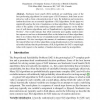Free Online Productivity Tools
i2Speak
i2Symbol
i2OCR
iTex2Img
iWeb2Print
iWeb2Shot
i2Type
iPdf2Split
iPdf2Merge
i2Bopomofo
i2Arabic
i2Style
i2Image
i2PDF
iLatex2Rtf
Sci2ools
114
click to vote
AI
2006
Springer
2006
Springer
On the Quality and Quantity of Random Decisions in Stochastic Local Search for SAT
Stochastic local search (SLS) methods are underlying some of the best-performing algorithms for certain types of SAT instances, both from an empirical as well as from a theoretical point of view. By definition and in practice, random decisions are an essential ingredient of SLS algorithms. In this paper we empirically analyse the role of randomness in these algorithms. We first study the effect of the quality of the underlying random number sequence on the behaviour of well-known algorithms such as Papadimitriou's algorithm and Adaptive Novelty+ . Our results indicate that while extremely poor quality random number sequences can have a detrimental effect on the behaviour of these algorithms, there is no evidence that the use of standard pseudo-random number generators is problematic. We also investigate the amount of randomness required to achieve the typical behaviour of these algorithms using derandomisation. Our experimental results indicate that the performance of SLS algorith...
| Added | 20 Aug 2010 |
| Updated | 20 Aug 2010 |
| Type | Conference |
| Year | 2006 |
| Where | AI |
| Authors | Dave A. D. Tompkins, Holger H. Hoos |
Comments (0)

